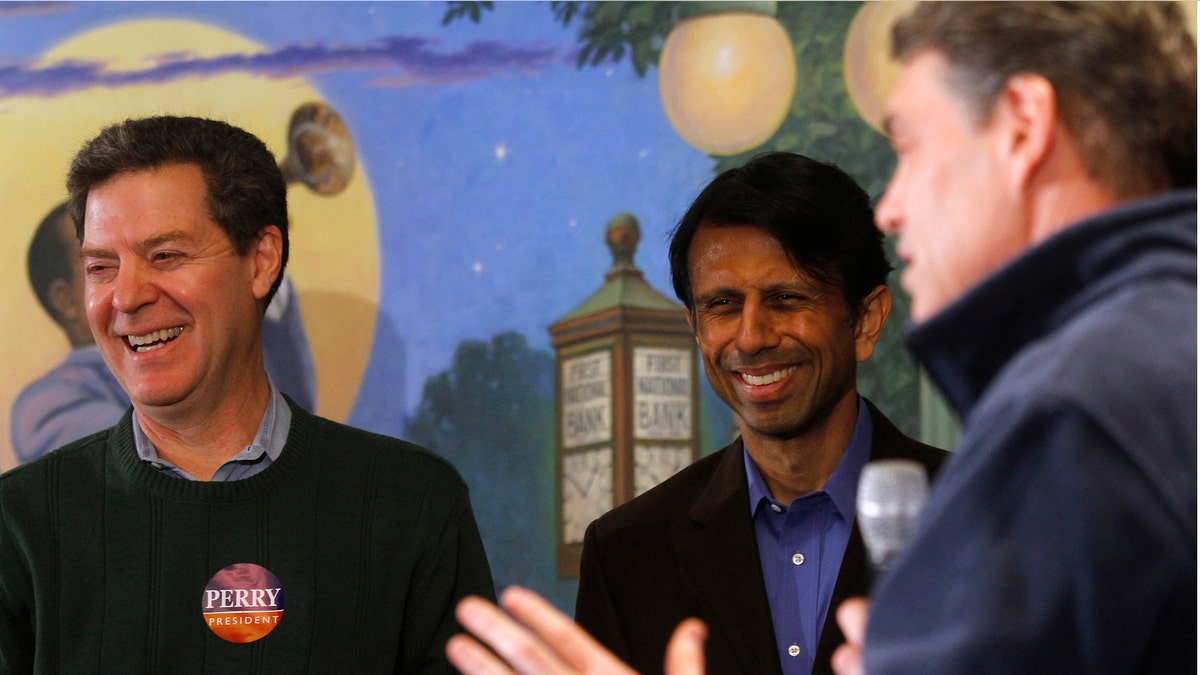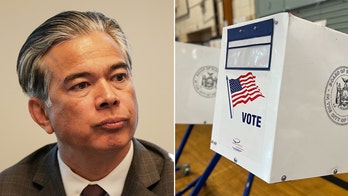
FILE: January 2, 2012: Kansas Gov. Sam Brownback (L), Louisiana Governor Bobby Jindal (C) and then-GOP presidential candidate and Texas Gov. Rick Perry in Perry, Iowa. (REUTERS)
Several Republican governors are proposing an end to their state income taxes in exchange for closing loopholes including mortgage deductions -- plans to make their states more competitive in the U.S. economy but already being criticized by Democrats.
Gov. Dave Heineman, Nebraska, and Bobby Jindal, Louisiana, earlier this week proposed eliminating the tax on residents and corporations.
Meanwhile, Kansas Gov. Sam Brownback proposed lower taxes for all residents in exchange for eliminating the tax deduction for interest paid on home mortgages.
Brownback’s mortgage-interest proposal is to help close a budget shortfall and was rejected last year by the state’s General Assembly.
He has been working for at least a year toward ending state income taxes and announced his plan Tuesday as part of his balanced budget proposal for fiscal 2014 and 2015.
Alaska, Texas, Florida, Nevada, South Dakota, Washington and Wyoming have no individual income taxes. Nevada, South Dakota and Wyoming have no corporate income taxes, according to the nonprofit Tax Foundation.
Brownback wants to drop the tax rate for the lowest earners from 3 percent to 2.5 percent, then to 1.9 percent in fiscal 2016. The top rate would go from 4.9 percent to 3.5 percent by 2017.
“Part of the governor’s proposal includes taking the next step on the state’s path to no state income tax,” the governor’s office said.
His proposals, including other real estate deductions, provide an additional $541 million in revenues for the fiscal year beginning July 1.
Brownback’s office also vowed the “glide path to zero” would not increase the sales tax nor include cuts to schools, higher education and essential safety-net programs.
However, Democrats and others have already criticized the proposal.
The non-partisan Institute on Taxation and Economic Policy said the proposal would benefit the rich at the expense of the poor. Its analysis essentially states the bottom 80 percent of Kansas income earners would collectively see a tax hike while the highest 20 percent would see substantial tax cuts, according to the Lawrence (Kansas) Journal-World.
Senate Democratic Leader Anthony Hensley called Brownback’s proposal “Robin Hood in reverse.”
“He is stealing from the poor and giving to the rich,” he told the newspaper.
Whether any of the Republican governors’ ideas would work on a federal level remains unclear.
Chris Edwards, director of tax policy studies at libertarian-leaning Cato Institute said Saturday that he supports the idea of states going to one major tax -- either income or sales.
“It helps citizens understand government,” he told FoxNews.com.
Edwards said the “worst” state taxes are those on corporations because of compliance issues and that eliminating them would be a good idea.
Though Edwards likes the governors’ approaches, he doubts whether they would work in Washington in part because states must have annual balanced budgets while the federal government does not.
“The federal government could not abolish individual income taxes because they raise so much money,” he said. “It would be much harder to do on the federal level.”
On Friday, the Republican-controlled House said they would vote next week on a short-term increase in the debt ceiling but on the condition that the next long-term vote on the issue would include a bona fide budget debate. The Senate has not passed a full-scale budget since 2009.
Congress returns to work after President Obama’s public inauguration Monday to face three fiscal issues with fast-approaching deadlines: the debt ceiling, massive cuts to the federal budget known as sequester and a budget resolution.
Washington and Congress agreed last month to a plan to postpone deadlines and to try to reach a more long-term solution by extending tax cuts only to families with incomes less than $450,000 annually.
Heineman wants to reduce business exemptions to the sale tax to make up for the lost revenue in eliminating the taxes. Nebraska's personal income tax rate is 6.84 percent, higher than such neighboring states as Colorado, Iowa, Kansas and Wyoming.
He said he would attempt to lower both tax rates should the Republican-controlled state assembly fail to pass legislation eliminating them.
Jindal wants to take the state’s personal income tax rate from 3.9 percent to zero.
The Associated Press contributed to this report.




